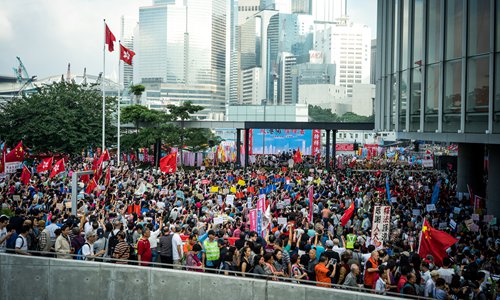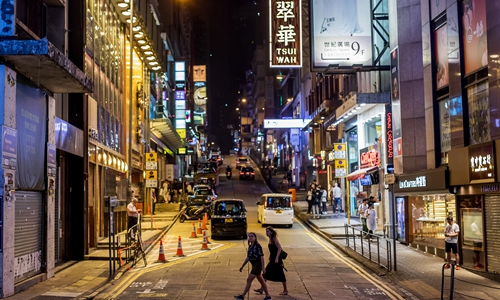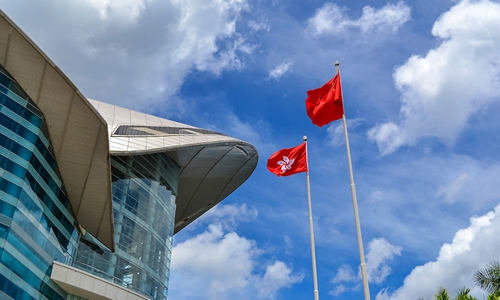HOME >> CHINA
Passing Article 23 an urgent mission for Hong Kong: official
By Yang Sheng and Chen Qingqing Source:Global Times Published: 2019/12/12 0:13:39
No passage of national security law not normal: experts

Hongkongers hold a rally protesting "Hong Kong independence" and expressing their support for the National People's Congress's interpretation of the region's Basic Law outside the Legislative Council in Hong Kong on November 13. Photo: CFP
A senior official of the Chinese government responsible for Hong Kong and Macao affairs published an article in the flagship newspaper of the Communist Party of China (CPC) pointing out that Hong Kong has neither passed the national security law nor established any institute for enforcement while Macao has already passed the law and improved a lot, and this is why separatist activities have been intensifying in Hong Kong in recent years. The People's Daily on Wednesday published a long signed article on its page 9 by Zhang Xiaoming, director of the Hong Kong and Macao Affairs Office of the State Council, headlined "Adhere to and improve the 'one country, two systems' institutional system" to comprehensively expound the correctness and feasibility of the "one country, two systems" in China.The article reflected the study and implementation of the spirit of the Fourth Plenary Session of the 19th CPC Central Committee on the special administrative regions (SARs) issue, while it stressed that strengthening the implementation and improvement of the national security legislation and enforcement mechanism as well as strengthening the capability of law enforcement in Hong Kong is an urgent mission for the HKSAR government and different groups among the society.

Pedestrians cross a road in the Central district of Hong Kong in October. Photo: VCG
Apart from national security, the article also touched many issues including how to integrate Hong Kong and Macao into the overall development of the country, how to ensure the central government's authority in SARs that are authorized by the Constitution and the Basic Law, and expressed the need to establish an anti-foreign interference mechanism in Hong Kong.Chinese experts said that publishing such an article at this time while Hong Kong is still suffering turmoil and Macao is waiting for the upcoming celebration of the 20th anniversary of returning to China, is delivering a signal that China is reviewing its policies and principles on governing SARs and it is trying to clarify some misunderstanding as well as introducing solutions and plans to solve long-existing problems and newly emerged challenges.
Establishing and improving a legal system for safeguarding national security in the SARs and improving related enforcement mechanisms are natural and have their practical needs, said the article.
"Macao has completed the legislation of Article 23 of the Basic Law, established the committee for safeguarding national security and its office, and has proactively added anti-separatism provisions to the Legislative Council's election law. The next step is to formulate and modify relevant supporting legislations."
"Hong Kong has not yet completed the legislation of Article 23 of the Basic Law and has not set up a corresponding enforcement agency. This is one of the main reasons why the activities of local radical separatist forces such as 'Hong Kong secessionists' have intensified in recent years."
Making a comparison between Macao and Hong Kong on this issue shows that the official of the central government wants to tell the people and officials of the two SARs what is right and what is wrong, said an anonymous Beijing-based Hong Kong and Macao studies expert.
"Why Macao is more secure and can focus on development rather than suffering from unrests, the national security law is a key reason. At least it can prevent foreign forces and anti-China separatists using discontent among the people to create and incite a massive political movement to hurt the city," he said.
It's difficult for the Legislative Council of Hong Kong to enact Article 23 of the Basic Law, but the Chief Executive could evoke the Emergency Regulations Ordinance to make regulations, which, however, would lead to a judicial review, Kennedy Wong Ying-ho, a solicitor of the Supreme Court of Hong Kong, told the Global Times.
It's abnormal that Article 23 has not been enacted since Hong Kong has returned to China for over 20 years. If national security could not be fully safeguarded, it would be far away from the universal suffrage, Tang Fei, a member of the Council of the Chinese Association of Hong Kong and Macao Studies, told the Global Times.

Hong Kong Photo: VCG
For the moment, the Public Order Ordinance, Societies Ordinance and Crimes Ordinance have certain interpretations concerning national security matters.However, they are obviously not strong enough, Tang noted.
"It requires more professional and much wider consultation on the matter," he said.
There's no special full-time police department or prosecutors handling cases related to national security and it's difficult for the police or department of justice to investigate and prosecute as soon as possible. Enactment of Article 23 has been delayed for years, the analyst said. "Because it's under the Basic Law and in line with 'one country, two systems' principle, it's reasonable to revive it despite of rising opposition of anti-government forces," he added.
Newspaper headline: Article 23 HK’s urgent mission
Posted in: SOCIETY,HK/MACAO/TAIWAN